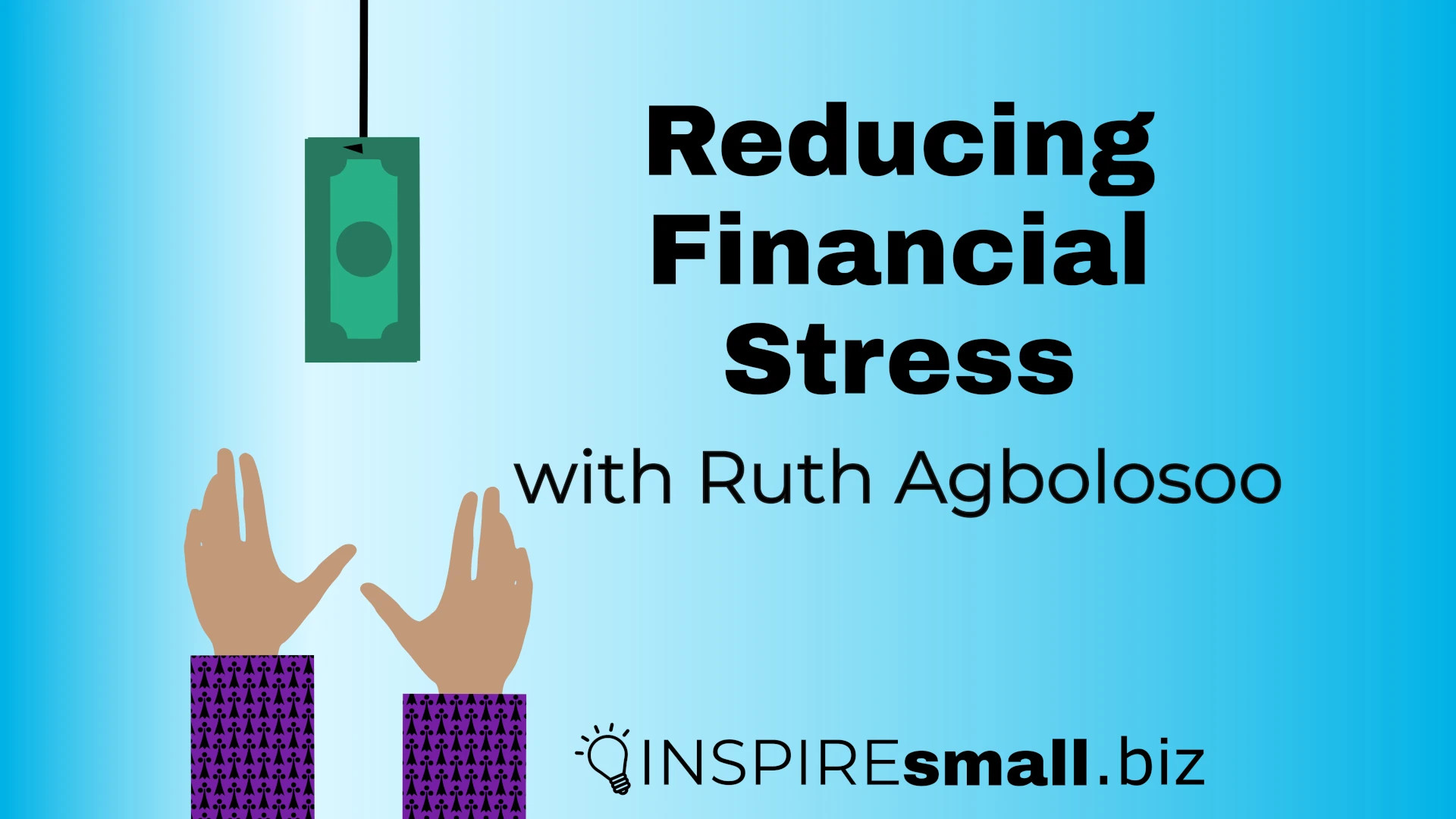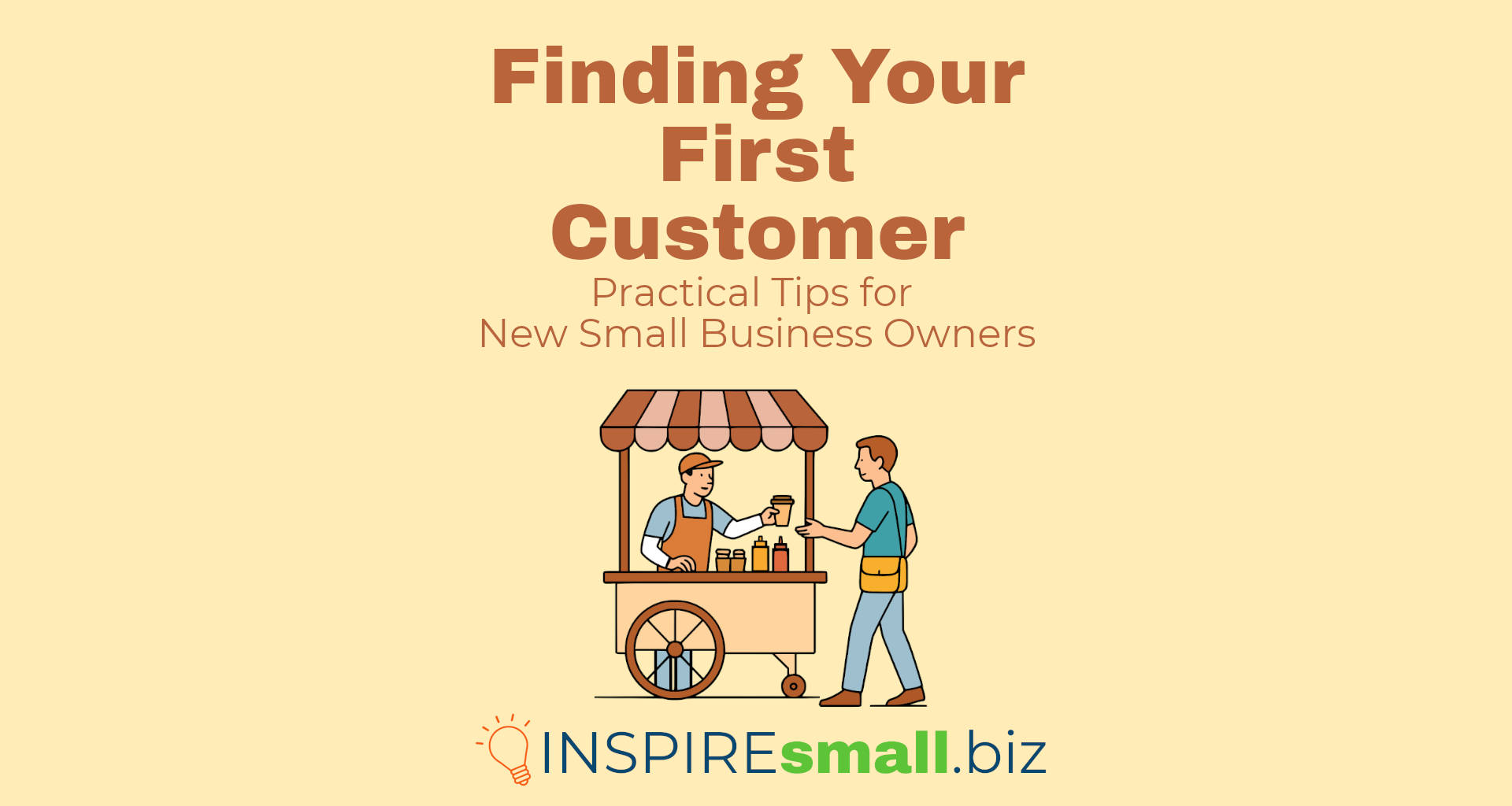Here is the transcript of Ruth Agbolosoo’s presentation:
Ryan: So now, as we continue with Stress Awareness Month, I would like to introduce our speaker today who, Ruth and I first met a couple of years ago when we were still recording the Open In Indiana podcast and it was fascinating to me, because while there are a lot of financial advisors out there who can sell you the products that they recommend that you need for, you know, accomplishing the financial goals you want,
Ryan: Ruth wasn’t restricted to that, that she was able to give the best advice for what works for you as an individual and where you want to go and the things that you need to have happen.
Ryan: So, as we were planning Stress Awareness Month, I wanted to invite Ruth to talk today about reducing financial stress because I know she’s going to have a lot of great information to share with us so everybody, let’s give Ruth a big round of applause. And Ruth, you have the floor.
Ruth: Thanks so much for having me again, Ryan. It’s been a while since I’ve talked for you guys, right?
Ruth: Unfortunately, I do not have my slide show. It was giving me a headache and to reduce my stress, I was like, I’m not using it, so I will be relying on my notes. If you see me look off camera you know, don’t feel any kind of way. I just want to make sure I stay on task with what I have to say, so feel free to unmute if I ask a question and get involved with the discussion, but before I start, I want to say that I am one of Ryan’s customers.
Ruth: I recently hired him to help me with tech, so I can tell you if you’re really stressed about something, he can definitely help you take that stress away. So yeah, just wanted to put in a plug for him ’cause he really hooked me up really good.
Ruth: Alright, so without further ado, let’s start. So, I want to throw out the question to you all.
Ruth: What is financial stress?
Ruth: What do you think is financial stress? Please unmute and let us know what you think is financial stress.
Ruth: Go ahead, Jennifer.
Jennifer: I was going to say living paycheck to paycheck.
Ruth: OK.
Jennifer: Yeah, I would say something similarly wondering if your income is going to cover your expenses. Frequently worrying about that.
Ruth: OK, anybody else before I read this definition?
Ryan: What about an influx of bills?
Ruth: Yeah, those are those are all financial stressors for sure.
Ruth: So according to the Financial Health Institute, financial stress is a condition that is a result of financial and or economic events that create anxiety, worry, or a sense of scarcity and is accompanied by a physiological stress response. So that is their definition.
Ruth: So, all of you hit the nail on the head as far as stressors.
Ruth: So what are some of the causes and you know, you have listed some of them there. One of them, the first one that I have listed is, oh, first of all, the name of this is Reducing Financial Stress.
Ruth: As a business owner, that is the title of this, so we’re going to take it from that stand standpoint as business owner. So, what are some causes of financial stress?
Ruth: Lots of expenses. As a business owner, we can incur so many expenses. And I mean, you know you have office supplies, you have assistance, you have apps that you have to purchase platform subscriptions, marketing and the list goes on and on and on. Won’t waste time listing all of them, but there are so many, or maybe it’s just me. I don’t know.
Ruth: There’s so many. Anyway, I’m stressed talking about it all right?
Ruth: Too many bills, so there’s bills and there’s expenses. And why list them separately is because some of those expenses you could probably cut off, but bills are usually things that you have to have.
Ruth: So, for instance, Wi-Fi. If you don’t pay for your Internet, you probably won’t be able to do some of the things that you need to do in your business if you rely on Internet, right? So that’s different.
Ruth: So, lots and lots of things that require your money rise in prices. That is a real stressor for a lot of people, because you know supplies that you need for your business.
Ruth: You know, before maybe it costs $5 to get your pack of, I don’t know, say, pens. Just a random thing. Now you need that same pack of pens and it’s costing you $10. You know? Figure that in so.
Ruth: Of course, that’s a little thing, right, but we’re talking about a lot of companies having to spend thousands of dollars more than what they were used to spending on things just because of rise of prices, gas prices, you know if you have to go see clients, like the Culligan Lady has to go out. You know that gas adds up really quick, I mean how much you have to pay for your gas.
Ruth: So little things like that.
Ruth: Well, I don’t know why I said little. Things like that can really cause a lot of financial stress.
Ruth: Not be not bringing in enough money. So, if you’re not really making much of a profit, your profit margins are pretty low, that can cause financial stress because raise your hand if you’re doing business to make no money, raise your hand nice and high.
Ruth: If you’re in business because you don’t want to make money. OK, so I’m just raising my hand just for an example, but that’s not me, OK?
Ruth: So, if you’re in business and you’re not making money or you’re making money, but it’s not really doing much for you. That can be a financial stress ’cause then you have to think, ‘Oh my gosh, when am I going to start making money?’
Ruth: How is it you know and all that stuff? So that can be pretty stressful.
Ruth: A disaster in your business. We’ve talked about this the last month with disaster preparedness, so things like your computer breaking down. It makes you want to cry. Right?
Ruth: Right, losing a major losing a major contract. If you’re in a situation where you rely on different contracts, you know that these people are going to pay you a certain amount of money, but you lose that. That can be devastating to your business.
Ruth: Theft – if someone breaks in and steals your equipment. Whether it’s in your car or in your office or wherever, or online theft and we talked about that last month as well.
Ruth: So, uhm, also health challenges. You know, if you have an assistant that’s sick or you yourself are not feeling well, what have you? That’s a disaster that can really impact your business and cause you financial stress.
Ruth: And then there are other disasters that can come up right? Exterior events, such as you know, you have a baby, I know that won’t fit in with Ryan or Bill, but you know.
Ruth: You know, if you have a baby, or a spouse is ill or a mom or someone else that is not a part of your business but some external factor is affecting your ability to make money in your business, then that can cause financial stress and the last one that I want to mention.
Ruth: And there’s probably some more, is high debt. You know, a lot of us, when we run our business we rely on debt for certain things, and the last talk that I gave was about how to run a debt free business, but let’s face it, a lot of times we do have to have some sort of debt in order to accomplish certain things.
Ruth: However, too much debt can be financially stressful, because if you’re not able to pay off that debt, then you’re just in a really tight situation and you know you might be just one check, one check away from being broke.
Ruth: You know, and having to close up shops, so all of those are things that cause financial stress.
Ruth: Now what are the signs of financial stress?
Ruth: There are different signs. Financial stress can manifest itself physically and emotionally.
Ruth: I mean, I think that a lot of people don’t even realize that it can have this effect, but it can cause like headaches, high blood pressure. It could cause weight gain, weight loss I mean.
Ruth: I need some financial stress that I need to lose some weight, but anyway it can cause like all of these things and sometimes we don’t even attribute it to it right?
Ruth: Depression, you know, we know, I think we’re all aware that there have been so many stories of people who have done horrible things to themselves because of losing money.
Ruth: So financial stress can be manifested in those ways.
Ruth: So, and as far as mental effects, it can affect our ability to make wise choices with our money.
Ruth: With our business, you know we will operate on at, you know, on a level of scarcity as opposed to abundance and knowing that you can do it and you can, you know everything is going to be OK.
Ruth: Instead, because you’re kind of desperate or something like that, it really affects the decisions that you make in your business.
Ruth: Now, how to reduce your financial stress?
Ruth: So, there are several ways and I have just written down a few of those ways that I felt were pertinent and practical, the first one is improve your money management skills.
Ruth: I know that might seem a little bit obvious to some, but maybe not to others, but just by improving your money management skills, you can really take off a lot of financial stress, and these are some ways that you can do that.
Ruth: Number one, having a budget for your business and actually sticking with it, and that can be challenging, especially when you know things come up that you really don’t expect in your business.
Ruth: It can really like knock you off your feet, but part of budgeting is also keeping in mind those what ifs and making sure that you have a slot prepared for those.
Ruth: Also having more cash. So, whenever you have a great month or a great year or a great day, making sure that you’re saving more, putting aside more of that money instead of just splurging, thinking about, hey, I need, this is gonna be a cushioning for later on, so making sure that you’re able to have some cash reserves there, and sometimes that looks like cutting out some things you know.
Ruth: Maybe not having your assistant work as much. Maybe canceling subscriptions that you normally use, you know, for your business, but you could probably do without.
Ruth: I know I have a membership that, you know, I’ve been thinking, ‘You know what? I probably should just cut this out ’cause I’m not really utilizing it well’ and I feel like I always want to be a good steward of my money, so I’m like. Oh, I hate to go, I really want to be in the group but I’m not really utilizing it to the fullest, and I could really use that cash.
Ruth: So, things like that you can think about, trim the fat a little bit and use that money to store up so that you can have a cushioning.
Ruth: We saw that with the recent pandemic, so many people, so many small businesses closed, you know, and for me, that’s really, really sad because we all know as well, business is how hard we work to start up to get going, marketing, all that stuff.
Ruth: So, to have to close is very heartbreaking, but a lot of times the reason why those businesses went down, it’s because they did not have a cash reserve or they didn’t have one big enough to sustain them in times of trouble.
Ruth: So that brings me to setting a goal to have a financial, I mean to have an emergency fund an emergency fund is very important when it comes to your business, of course.
Ruth: Working on a one-on-one basis with individuals whether they own a business or not, I always recommend an emergency fund, but unfortunately a lot of people don’t have those for their businesses and it’s really, really important because you’re not guaranteed to always make the amount of money that you’re making right now.
Ruth: You’re not guaranteed that you’re going to be well enough, you’re not guaranteed that your employees will do what they’re supposed to do, your, there’s no guarantees right? So, it’s important to set an emergency fund goal and work towards achieving that.
Ruth: So, whether it’s three months worth of a certain amount of money of earnings or six months or whatever it is, work your way up to it by saving every time when you have a windfall.
Ruth: That’s an excellent way to just like store money away so that you can have that Peace of Mind and not experience that financial stress if there’s a disaster or something else that comes up.
Ruth: And then another way to reduce your financial stress is by outsourcing money tasks.
Ruth: I know that you know a lot of people may see this as oh, but I’ll be spending more money. But spending money is not necessarily what causes financial stress. Sometimes it can, if you’re overspending, yes, but sometimes that’s not really the reason why you’re experiencing financial stress, but sometimes you need help.
Ruth: You know, sometimes just being the one to look at all the books yourself while you’re trying to manage 50 other different things causes financial stress. Sometimes you need to find an accountant, sometimes you need to find a bookkeeper, you know or what have you?
Ruth: Whatever they are, to be able to help you so that you can see what’s going on clearly without you actually having to do everything, excuse me, all the time and also they can catch a problem that maybe you would have missed because you’re doing so many things and then if they catch the problem ahead of time, then you can solve it without feeling financial stress.
Ruth: Or maybe not that level of financial stress that you would feel had you not caught it early. So, that’s why I, ’cause I really believe in outsourcing as much as possible because honestly, as a business owner when you’re doing everything yourself, that in and of itself can be super stressful depending on what you do.
Ruth: I mean, maybe you do something that’s not really stressful at all but for me personally, I’ve noticed that the more I get other people to do, the less stress I feel and when it comes to financial stress, it’s no different, like you just really want to not have to do everything yourself and have eyes that are trained to see what’s going on with your finances so that they can tell you ahead of time.
Ruth: ‘Hey look, you know we’re going close to that red line.’ You know? What can you do to scale back?
Ruth: You know you don’t want to go that far.
Ruth: So, the final, the final one that I have is, oh the other thing about hiring someone is that you can,
Ruth: If you hire A financial professional to help you sort out your finances and see where you are and you guys communicate, you have charts, you have apps or whatever, then it gives you that Peace of Mind because it’s not that you’re just going to give away everything to them and not know anything that’s going on.
Ruth: I really don’t believe in that and I wouldn’t feel comfortable with that. But it’s just that you have a way of having it organized for you so that you can easily access that without the drudgery of having to do all the steps. So hopefully that was clear enough.
Ruth: There’s more that I could say about that, but I don’t want to go over time.
Ruth: And then the last step or the last tip that I would recommend is changing your mindset.
Ruth: Because if you look at your current situation, so if you’re in a financially stressful situation and you kind of get that woe is me, you know ‘I suck at business, you know, I’m really just not good at this. I’m not cut out for this. Maybe I should go work at Wendy’s’, you know and all of that and you just kind of get in that mindset that it makes it harder for you to come out of it and figure out a solution to your problem.
Ruth: So, it’s important to be solution-focused in order to relieve that financial stress, you know, look at the situation that you’re in. You know, whether it’s too much debt, too many expenses, whatever it is. Look at it objectively and realize that it’s not the be all end all.
Ruth: It’s not the end of life, figure out well, what can you do? What steps can you take to rectify the problem?
Ruth: And if you need help, obviously reach out.
Ruth: But sometimes it’s just a matter of sitting with yourself and looking at the information in front of you and figuring things out. But definitely you don’t want to start going down that rabbit hole of oh man, I should have listened to my mother, I should have done.
Ruth: And just like you know, this business thinks, yeah, I’m not gonna do this anymore and it’s just, so mindset really, I tell people that all the time your mindset can really change your situation, because that’s where it starts, because then you think OK, this is not too big.
Ruth: I can figure this out.
Ruth: I need some time but I can figure this out and then you can find solutions and start to see what.
Ruth: S, if this has been helpful to you, come let me know what you’re what you think.
Ruth: You know, what resonated with you, or if there’s something else that you’re thinking of that could be a great way to alleviate financial stress.
Ruth: I know I didn’t cover the full gamut because we have 50-minute talk, so yeah, go ahead and unmute.
Ryan: [Your] presentation had some really, really good information. My question for you is what are some of the most common expenses that businesses have that aren’t necessary?
Ruth: Oh, that is a very good question. I mentioned one, and they’re not part of an organization where you feel like there are like-minded people but are in a crunch or you’re in a situation where it might be too tight or you don’t have an emergency fund, then you might want to back away from that.
Ruth: That’s one of those things. I needed that, maybe they were one off, so you probably needed it for a project, but then you just kept it. So, then you’re paying every month for it, it’s best to just cut it off, so that’s another one.
Ruth: And let’s see another one that’s not that may not be as necessary, you know, I think, I think you know, it just depends on the industry.
[Thank you Ruth Agbolosoo for your presentation of Reducing Financial Stress!]



